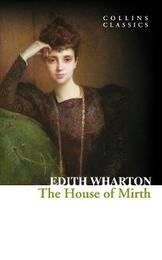
|
The House of Mirth (Collins Classics)
Paperback / softback
Main Details
| Title |
The House of Mirth (Collins Classics)
|
| Authors and Contributors |
By (author) Edith Wharton
|
| Series | Collins Classics |
|---|
| Physical Properties |
| Format:Paperback / softback | | Pages:432 | | Dimensions(mm): Height 178,Width 111 |
|
| Category/Genre | Classic fiction (pre c 1945) |
|---|
| ISBN/Barcode |
9780008110581
|
| Classifications | Dewey:813.52 |
|---|
| Audience | |
|---|
|
Publishing Details |
| Publisher |
HarperCollins Publishers
|
| Imprint |
William Collins
|
| Publication Date |
21 May 2015 |
| Publication Country |
United Kingdom
|
Description
HarperCollins is proud to present its incredible range of best-loved, essential classics. 'Do you remember what you said to me once? That you could help me only by loving me? Well-you did love me for a moment; and it helped me. It has always helped me.' Lily Bart, an attractive young woman living in New York City, relies on beauty and charm to ensure economic survival. Determined to marry into wealth to support her expensive lifestyle, Lily denies her feelings for Lawrence Stern due to his modest income. She turns instead towards young millionaire, Percy Grace. During her pursuit of money and status, Lily becomes the agent of her own undoing. Events take a tragic turn and her reputation is ruined by scandal. She is unwilling to adhere to the standards of New York's social elitism, which leads to devastating consequences. Wharton's stunning and disturbing commentary on the role of women in this irresponsible, hedonistic society will delight those enchanted by her Pulitzer Prize-winning novel 'The Age of Innocence'.
Author Biography
Edith Wharton was a Pulitzer Prize-winning American novelist, known for such classics as The House of Mirth, Ethan Frome, and The Age of Innocence, for which she won the Pulitzer Prize in 1921. A member of the New York elite, Wharton drew on her experiences as part of society to critique its inner workings and the conflict between personal desires and societal norms. Wharton died in 1937, leaving behind a rich literary legacy.
Reviews'its depiction of social mores and their influence gives it universal resonance.' Guardian 'crackling and complex prose'. Independent
|